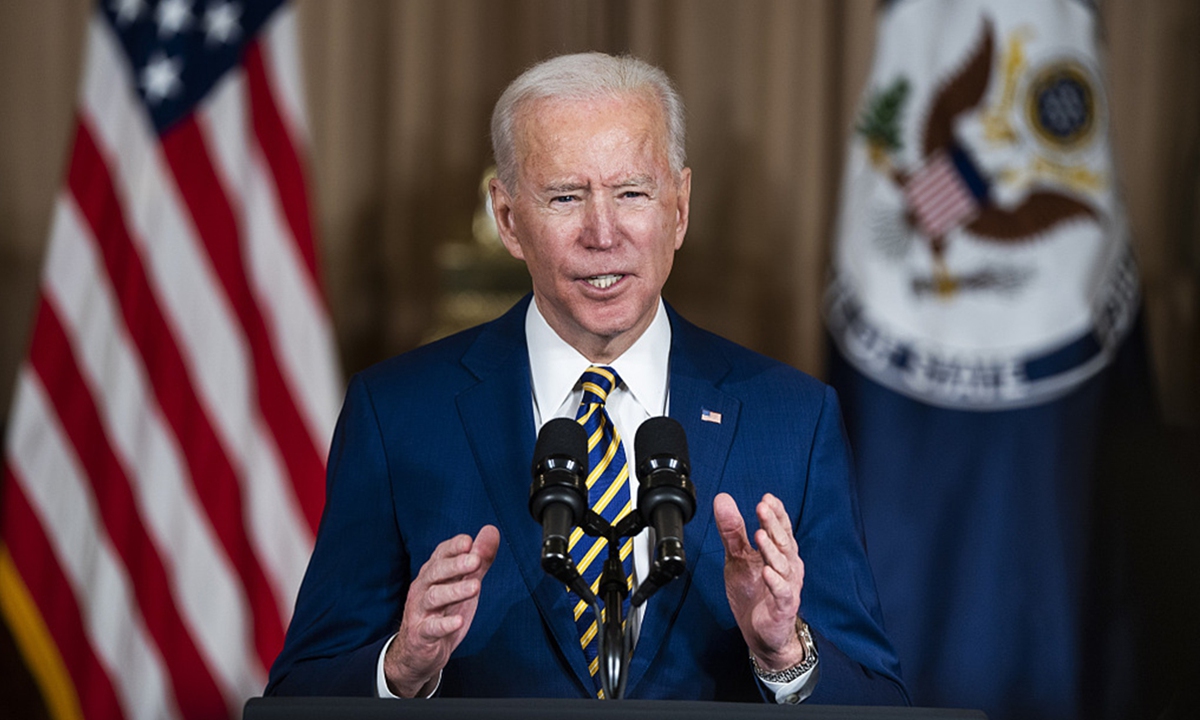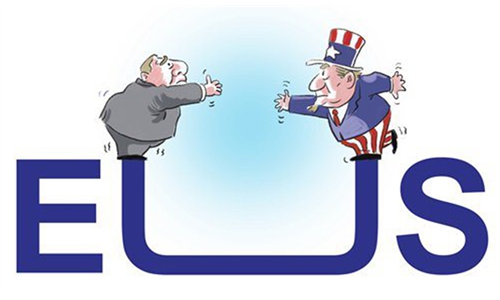Will Biden visit Kiev? A 'soap opera' reveals US true intent to exploit war profits

US President Joe Biden. Photo: VCG
At the White House briefing on Monday, press secretary Jen Psaki said there are "no plans" for US President Joe Biden to visit Ukraine. Last month, Biden said that he wanted to cross the Polish border into Ukraine, but "they will not let me," referring to US officials. The "soap opera" of whether Biden will visit Ukraine shows that the US "stands with Ukraine" is just a play on Ukraine and uses it for war profits.Now, Ukraine is certainly unable to hold Russia's operations in Donbass. It is clear that sanctions alone will not bring about a ceasefire at this point in the Ukraine crisis. What role does the US play in this conflict?
Biden once said that he had two options: Start a third world war, go to war with Russia, physically; or make sure that Russia pays a price for having done it. The fact that Biden chose neither to send troops to fight a war with Russia nor to visit Ukraine largely indicates that US involvement in this conflict is limited. In such a situation, the bargaining chips for Ukraine are diminishing.
Psaki noted during the press conference that sending troops to Ukraine is not in US national security interest or in the interest of the American people, which has indicated the US attitude. Since the outbreak of the crisis in Ukraine, it's obvious that the US sanctions won't stop Russia's actions and the position of the US is becoming more and more embarrassing as the situation changes.
If Washington wants to be a "peacemaker" in Ukraine, it should promote peace talks and stop its massive military support to Ukraine. As the conflict has lasted for more than 50 days, it is time for the international community, including the US, to rethink how the crisis in Ukraine can be addressed.
CNN reported on Monday that the US and its allies face a new dilemma on military aid to Ukraine. They have to determine where Russia's "red line" lies and how much they can continue to assist Ukraine, which continues to put pressure on the US. Now the Biden administration is putting itself in a difficult position, since it has nothing to gain by prolonging the war. As the US faces rising oil prices, record inflation and other problems, it has become much harder for the US to profit from the conflict.
The US thought it could form a united front with freedom, democracy and human rights values. But such an idea hasn't been fully realized in the Ukraine crisis.
The Washington Post reported on Saturday that "the Biden administration and its European allies have begun planning for a far different world, in which they no longer try to coexist and cooperate with Russia, but actively seek to isolate and weaken it as a matter of long-term strategy."
It's clear that the US will engage in long-term suppression against Russia - but this doesn't mean the US was ready before the Ukraine crisis broke out. The ongoing conflict has dragged the US into the current dilemma, making Washington's international approach tilt more toward the so-called neorealism, which emphasizes the role of advantages in science and technology, economy and finance in US' campaign against Russia.
During the US Department of State's press briefing on Monday, spokesperson Ned Price raised again the false accusation that China "supports Russia's brutality against the people of Ukraine." He suggested China's emphasis on "state sovereignty" and "viability of borders" was "just a show, just bluster."
He also threatened that if China "were to provide weapons, supplies, were - seek to help Russia evade sanctions, there would be strong consequences for that, not only on our part but also on the part of our allies and partners."
The US has set clear its boundary in the Ukraine crisis while blaming and slandering China's constant stances. The US is aware its neoliberal unipolar hegemonic system is collapsing. Therefore, it is taking advantage of the Ukraine crisis to kidnap its allies in a bid to contain Russia and China. US' policies will be more confrontational. In the future, Washington will become more indifferent to other countries' interest in its pursuit of hegemonic interests and strategic goals.
However, if the US continues its current suppressive measures against Russia and China, not only globalization will be reversed, world peace and stability will also run into new difficulties. In the meantime, it will backfire on the US.
The author is a professor of international relations at Nanjing University. opinion@globaltimes.com.cn



